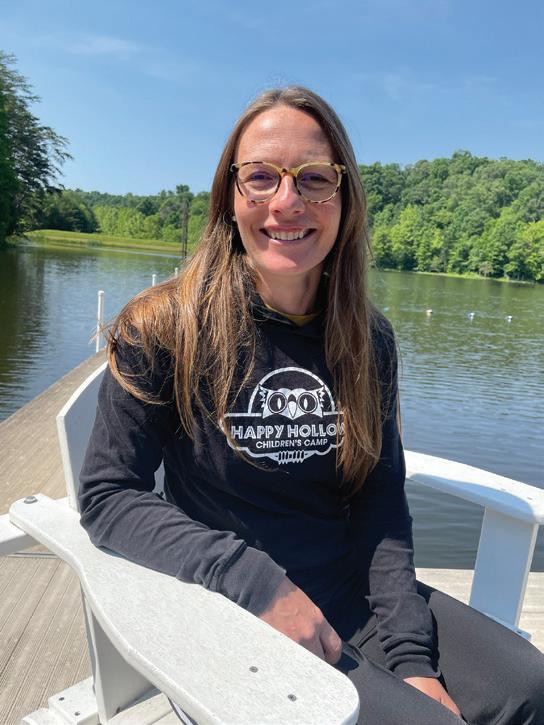
5 minute read
Happy Hollow Camp
Camp Executive Director Sara Noyed.
~story and photos by Bob Gustin
For a week in June this year, 80 children with hearing loss felt at home in the woods while learning, creating, exercising, and playing at Happy Hollow Camp in southern Brown County. And their isolation disappeared as a sense of community took over.
The camp, located off Bellsville Pike, was founded in 1951 by a group of Indianapolis civic leaders. The camp consists of 850 acres, but only about 100 acres are actively used, with the rest managed by the Nature Conservancy. Over the years, it has served more than 45,000 children.
Happy Hollow is open all year, but most active in the summer. Currently, more than 2,000 children come to camp here annually for outdoor activities, arts and crafts, environmental education, and to have a little fun. About 30 staff members work at the camp, which is accredited by the American Camp Association.
Between rounds of archery practice, camper Rebecka Dealey-Cooper took a few minutes to reflect about her experience.
“I belong here,” the New Castle teen said. “People actually like me.”
Attending as part of a group from Hear Indiana, a statewide association for children with hearing loss, she said she sometimes is alone because she is “different.” But with fellow campers at Happy Hollow, she said, “This place is perfect.”
Much has changed at the camp since its founding, but its mission to serve Indiana’s children with outdoor experiences while encouraging human potential through exploration, connection, and self-discovery, has not.
“We want all kids to be able to enjoy camp,” said Sara Noyed, Happy Hollow’s executive director.
She said all kids between ages 7 and 14 are welcome to apply. Children whose family members are eligible for free and reduced school lunches can attend for $80 a week, she said, and others can attend on a sliding scale, depending on family size and income. Applications for camp can be made online or over the phone.
The camp has a $1.2 million annual budget, funded primarily by individual donations, grants, and fundraising, with some money coming through the government-sponsored AmeriCorp program. About 80 percent of children attending get scholarships.
Noyed has been executive director of the camp for about 2 ½ years. She works both at the camp and from an Indianapolis office.
“I’ve always been a camp person,” she said. “I did it as a kid and I felt like a different person.” She said the camp experience made her more confident, helped her realize who she was around other people, and encouraged her to try new things. Growing up as a shy Milwaukee resident, she said she wants camp “to do for other kids what it did for me.”
She studied recreational management and environmental studies at the University of Wisconsin, and now lives in Indianapolis with her two daughters, aged 13 and 15, her husband, and two dogs.


Many of the children who come to camp are from lower income families. Noyed said the first summer she worked at Happy Hollow, she was struck by the number of campers pushing toward the front of the line at mealtime, and discovered they were doing that because they wanted to make sure food was left by the time they got to the serving area. But after realizing everyone could have seconds, or even thirds, there was no longer the food scramble by the end of the week.
She recalls one camper who did not clean up after himself, leaving wrappers and garbage at the table after eating. But before a staffer could call him out on it, another camper did so. “Positive peer influence” broke the sloppy habit, Noyed said.
Staff members come from across the state and the nation, and some are international residents. Noyed pointed to one staffer who lives in Ireland, but attended the camp as a child, just like her Irish father did. Most staff members are college students, and Noyed said all “have a passion for the outdoors and a passion for working with kids.”
The camp has initiated a counselor-in-training program for teens between 15 and 17, and continues to look for staffers, who must be 18 years old.

”I belong here. People actually like me.”—camper Rebecka Dealey-Cooper
Some of the typical campers who come to camp each summer include church, school, and business groups, as well as family reunions and mixed groups. It has historically offered activities focused on children from lower income communities, the foster care system, and those with special medical needs such as asthma, diabetes, and muscular dystrophy.
Campers can try swimming, canoeing and kayaking Lilly Lake. Horseback riding, high and low rope exercises, archery, ziplines, and gaga ball (a modified sort of dodge ball), are also available.
Hiking, environmental science workshops, leadership exercises, and outdoor survival skills are areas of focus.

Brown County resident Bill Freeman became a member of the camp’s board of directors about 20 years ago after meeting Bernie Schrader, former executive director of the camp. Learning about the camp’s mission, Freeman said he hoped to help serve underprivileged kids during his retirement, and has been able to use his construction experience to enhance camp facilities.
“It is my personal feeling that helping any underprivileged child helps the community,” he said, and helps give them a better direction in life.
Interested families may apply online at happyhollowcamp.org and fill out forms, or call the office at 317-638-3849.







